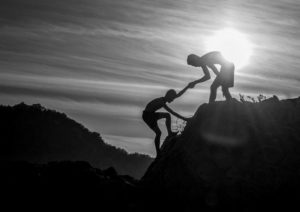REsources for Living
January 1, 2018Podcast: Download (Duration: 5:09 — 4.7MB)
Subscribe: More
 One of the important ways of understanding this month’s theme of resistance is in terms of resisting injustice, or fighting back against the powers of evil, like the Resistance in the Star Wars movies. We practice resistance any time we push back against oppression.
One of the important ways of understanding this month’s theme of resistance is in terms of resisting injustice, or fighting back against the powers of evil, like the Resistance in the Star Wars movies. We practice resistance any time we push back against oppression.
We also, however, practice resistance when we push back against things that are not evil, unjust or oppressive, and in fact might be just what we need to learn and grow. Psychologists use the term resistance to describe the ways people actively avoid insights that challenge the stories they tell themselves. We resist uncomfortable truths that push us to change how we act, or how we see ourselves in the world.
This kind of resistance is natural, and maybe inevitable. People tend to want to keep things stable, even if the way things are isn’t working very well. Many of us have at some point stayed in a friendship or a job or a romantic relationship or a religious community that really wasn’t right for us, because we just couldn’t face the change involved in leaving. And most of us have probably clung to stories or ideas about ourselves or history or how the world works even in the face of evidence that the stories we are holding on to just aren’t true.
Plenty of people were upset, for instance, when astronomers decided that Pluto wasn’t a planet, just a big ball of ice hanging out in our solar system—and not the only one, at that. But…but…I learned in school that our solar system has nine planets! What do you mean there are only eight? I liked our littlest planet out there in the far reaches of our solar system. Why do you have to take it away from me? That voice of protest? That’s resistance.
Of course, resistance shows up in ways that are far deeper and more personal than how we feel about a planet getting downgraded. Have you ever thought that you’d love to run a 5K or try painting with oils or join a robotics team or audition for a play—only to have a voice inside insist that it would never work or that you would just make a fool of yourself? That’s resistance pushing against the idea that you could change the story of who you are or what you can do.
But there are also ways, just as deep and just as difficult, that we resist changing stories of who we are as a nation or a community or a culture.
In the US resistance has even gone as far as violence, when people have pushed back against acknowledging that statues honoring confederate heroes have been placed in the public square in order to glamorize and excuse a history of slavery and white supremacy. We get attached to stories that foster pride in who we are and where we came from. It’s only natural to cherish and repeat those stories, and in many ways it’s a good thing. But the real picture is often more complicated than we were led to believe.
Jefferson was a brilliant architect of democracy and a slaveholder who chose his economic interest over any kind of justice for the people whose lives he controlled. Margaret Sanger was a pioneer for birth control and reproductive rights and she embraced eugenics, holding a deeply distorted view of who should be born and who should not. Pioneers for women’s suffrage were courageous heroes fighting for women’s rights and many of them were willing to throw the cause of abolition under the bus to get there.
When we resist knowing and acknowledging the full complexity of the stories that shape our identity, whether those are family stories or national ones, we disconnect not only from the truth of the world we live in, but also from the complex truth of who we are and how we are in relationship with others. Resistance to the truth narrows our world and limits our ability to respond creatively.
For instance, resistance to the painful truth of climate change leads to policies that refuse to engage in a wide range of practical things we could do right now to reduce the impact of climate disruption.
Uncomfortable truths are, well, uncomfortable. There’s no way around it. But we can learn to recognize what it feels like—the tension in the chest, the sinking feeling in the gut, the denials in the mind—and sit with them long enough that we become able to respond in the spirit of curiosity rather than fear or anger.
Resistance, for better or for worse, means pushing back against something. At times, pushing back is the best thing that we can do. Some things need to be pushed back before they overrun us all. But at other times we push back against the very things that might save us. And so resistance needs to walk hand in hand with curiosity. A faith that unsettles us may also be what moves us
forward into the land of possibility.
- REsources for Living - December 1, 2020
- A Fond Goodbye - December 1, 2020
- REsources for Living - November 1, 2020
Quest Monthly Print Edition
Recent Issues
Latest Spiritual Reflection Posts
Weekly Newsletter
About
Quest for Meaning is a program of the Church of the Larger Fellowship (CLF).
As a Unitarian Universalist congregation with no geographical boundary, the CLF creates global spiritual community, rooted in profound love, which cultivates wonder, imagination, and the courage to act.
Contact
Church of the Larger Fellowship Unitarian Universalist (CLFUU)
24 Farnsworth Street
Boston MA 02210

